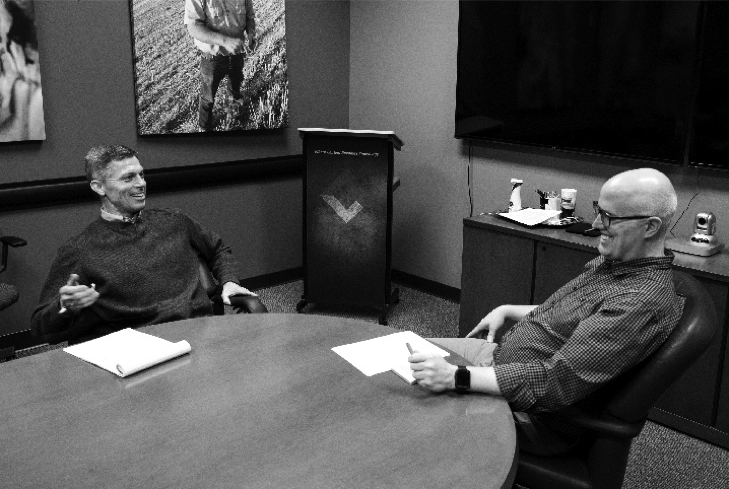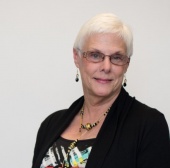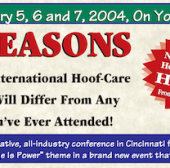Moderated by Rachel Hanrahan, Digital Content Specialist
From the Lessiter Link-Up column of the April 2019 Lessiter Link newsletter
Jeremy McGovern
Job Title: Executive Editor and Publisher for AFJ and the International Hoof-Care Summit
Years of Experience: 20 (11 at LM)
Revealed Fact: Worked at Astronomy.com for 7 years, where he met Michael Ellis
Michael Storts
Job Title: Vice President of Finance and Administration
Years of Experience: 32 (8 at LM)
Revealed Fact: Helped run his family's sporting goods store until 2010
For coworkers with highly contrasting backgrounds, Jeremy McGovern, Executive Editor/Publisher for American Farriers Journal and the International Hoof-Care Summit, and Michael Storts, Vice President of Finance and Administration, agree that Lessiter Media is an exceptionally unique workplace. They came together to discuss their roles at LM and how they have evolved along with the growth of the company.
Day-to-Day
Michael Storts: Accounting is trying to capture in financial terms, what's going on in the business. I guess on your side, you're producing the stuff and we're dealing with it after it happens. We try to figure out the details behind what happened, if it's something new or if we have question on how something happened. We want to see trends and measure our financial success or failures, so we can make better business decisions.
Jeremy McGovern: LM doesn't keep its team from knowing what's going on financially.
Storts: I manage fulfilling all of our administrative and fiduciary responsibilities. There is always some state or governmental inquiry or regulation we need to fulfill. Anytime we have an event in a different state or hire from out of state, we have to register with the respective Secretary of State. We capture the day-to-day activities of what happens here and make sure they're classified properly within our own financial structure.
McGovern: From the content side of things, my work is less and less. LM really disrupts the idea of what an editor is, and I think that's for the best. We have a more versatile staff. Any of us can handle planning a conference. A good content producer can support the sales staff. It's not just about the media. That's culture that we've fostered here.
Storts: Our challenge is not only accuracy, but also timeliness. We can't wait 2 or 3 months for information to hit our desks. By that time, a lot of things could've changed. We're constantly trying to push ourselves to work faster, while still maintaining accuracy. We are always trying to improve.
Whom Do We Serve?
McGovern: I have never worked for an employer that is as interested in my professional development as LM. There is no fear that you're going to learn something for yourself and then leave the company. Other publishers I've worked for have only been interested in my professional development if it benefited them, like software training, for example. At LM, if you go out and learn something, you can bring it back and improve everyone here. That's no a culture I've seen at other publishers.
If you bring in somebody that's passionate about the writing, they don't need to know horses or equipment of farming techniques. I can remember light bulb moments in previous years of starting to understand this industry. That's really served me well when producing content. It's something I still really enjoy but it's not going to help AFJ if I write 8 feature in every issue or spend my time editing videos. LM initiating the idea of lex staff and investing in new talent has been the best change in my time here. Our staff is a bit of a Swiss Army Knife. You can't have someone only focus on one thing.
Storts: Another aspect of my job outside of accounting and finance is the human resources side. Being a small company, we don't have a full-fledged HR department. There is a portion of every day that goes to helping the employees resolve issues or address concerns so that they're comfortable in their position. The people I'm serving are not necessarily our subscribers or advertisers. My customers are the LM employees. We do what we can to make their jobs easier.
McGovern: I think that's true for all of us. We always think of our external customers and sometimes we forget that internally, there are customers, too. It's not necessarily that Ads Services serve me, for example. There are supportive departments, but it goes both ways. When we fail to serve each other like customers, there can be a breakdown. When things get bogged down and there's not enough communication, we lose efficiency.
One and Only
McGovern: We have a tremendous responsibility to the industry. We are the only farrier publication left in the U.S. When I started, there were 5. The audience may not agree with what we write every time, but to me, we have an obligation to serve this industry. I don't check to see if someone is a subscriber before I answer the phone or an email.
Storts: You being in the industry as long as you have been, previously having 5 competitors and now having none, what caused the collapse of the others?
McGovern: I suppose you can always say it was a lack of resources, whether it was financial or content related. Three of those publishers didn't have strong publishing backgrounds. Two of them were start-ups by farriers. Something separates an entrepreneur publisher like Frank from a farrier that also writes. A lot of their articles get to nuances that Jeff and I can't write about.
Storts: I gather that they forgot the business side of the business.
McGovern: Everything is about your relationships. If I'm not calling an advertiser wanting to know their input, we're not serving them. If we're not serving them, we're failing. That goes back to how we must be a Swiss Army Knife. If we isolated our editors and said "No, you can only produce content, we don't want you involved with ad sales," I don't know that we'd still be around.
Storts: You had mentioned that farriers/publishers were still getting some nuanced information out there that you couldn't address because of your background. For me, not being a content producer, looking at your who write for greatly technical industries, that's very intimidating. It would be frightening for me to write to an audience who relies on technical information. Not being a farrier yourself, how do you find that balance?
McGovern: You can't be scared. You remain humble. I never go in pretending to be something I'm not. I'm a writer. Let me tell your story. Our strengths are producing content, not pretending to be a horseshoer.
Behind the Scenes
Storts: A role of mine that might not be on the radar is the different government filings that have to be handled to be in compliance. Another task that's being the scenes is the business insurance side of LM. There are risks that any business could encounter that we have to protect against. It falls on us to make sure we have adequate coverage.
McGovern: There are no great mysteries about my job. Mike, you probably have a better handle on content generation that you'd admit to, because you can see through the budgetary process of our day-to-day or year-to-year tasks. And when we have new ideas, like the virtual events, we want your advice.
Storts: Not having any experience in publishing when I joined LM, my view was simplistic. You write the content, put some advertising behind it, market to a subscriber base and repeat. When I came in, we were in the early stages of developing the digital side of the business. I realized how progressive the company was, and still is, in terms of staying in front of where the market is going. Doing this all while maintaining the "meat and potatoes" of the print content is encouraging. LM recognized where growth opportunities were and saw where the industry was going; they had enough foresight to see they had to change along with the industry.
McGovern: When you look at people who have been successful here, a consistent them among them is that they were given an opportunity to make a change and they took it. On my 1st day here, Frank told me he had seen a guide for new mortuary school graduates and he wanted me to do the same for farriers. I asked him what the budget was, and he replied, "You tell me." After 5 questions, I caught on. He knew he wanted this done and that's what became AFJ's career guide. With everything that's happening in publishing, our growth is pretty remarkable. It doesn't matter who you are in this company, if you see any issue and you bring it to light, not only is it appreciated, it's encouraged.





